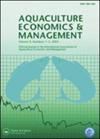Effects of co-management on technical efficiency and environmental stressors: An application to small-scale shrimp polyculture in Indonesia
IF 3.8
2区 经济学
Q1 AGRICULTURAL ECONOMICS & POLICY
引用次数: 8
Abstract
Abstract Shrimp polyculture is an important activity in South East Asia, providing a livelihood and food for small-scale farmers. However, farmers are facing challenges due to increasing environmental problems in rivers used as the primary source of water in aquaculture pond production. To deal with these challenges, farmers have organized co-management communities, which gives them a stronger voice among river users. This study investigates the effects of co-management on technical efficiency and environmental stressors using a second-stage Data Envelopment Analysis model. Environmental stressors are identified through interviews with 306 farmers in eight sub-districts, of which two are practicing co-management. The results show that farmers in areas with co-management have relatively high technical efficiency after taking other drivers into account. Furthermore, the farmer’s technical efficiency seems to be less affected by the identified environmental stressors. In conclusion, co-management could be used as a tool to improve technical efficiency and limit stress factors for farmers. It could be initiated by the farmers themselves or by policymakers and natural resource managers and could improve the livelihoods of small-scale shrimp polyculture farmers.共同管理对技术效率和环境压力的影响:在印度尼西亚小规模对虾混养中的应用
摘要虾混养是东南亚的一项重要活动,为小规模农民提供生计和食物。然而,由于用作水产养殖池塘生产主要水源的河流的环境问题日益严重,农民面临着挑战。为了应对这些挑战,农民组织了共同管理社区,这使他们在河流使用者中有了更大的发言权。本研究采用第二阶段数据包络分析模型研究了共同管理对技术效率和环境压力源的影响。通过对八个分区306名农民的访谈,确定了环境压力源,其中两个分区正在实施共同管理。结果表明,在考虑其他驱动因素后,共管地区的农民具有相对较高的技术效率。此外,农民的技术效率似乎较少受到已确定的环境压力因素的影响。总之,共同管理可以作为提高技术效率和限制农民压力因素的工具。它可以由农民自己发起,也可以由政策制定者和自然资源管理者发起,并可以改善小规模虾混养农民的生计。
本文章由计算机程序翻译,如有差异,请以英文原文为准。
求助全文
约1分钟内获得全文
求助全文
来源期刊

Aquaculture Economics & Management
FISHERIES-
CiteScore
7.30
自引率
17.90%
发文量
21
期刊介绍:
Aquaculture Economics and Management is a peer-reviewed, international journal which aims to encourage the application of economic analysis to the management, modeling, and planning of aquaculture in public and private sectors. The journal publishes original, high quality papers related to all aspects of aquaculture economics and management including aquaculture production and farm management, innovation and technology adoption, processing and distribution, marketing, consumer behavior and pricing, international trade, policy analysis, and the role of aquaculture in food security, livelihoods, and environmental management. Papers are peer reviewed and evaluated for their scientific merits and contributions.
 求助内容:
求助内容: 应助结果提醒方式:
应助结果提醒方式:


